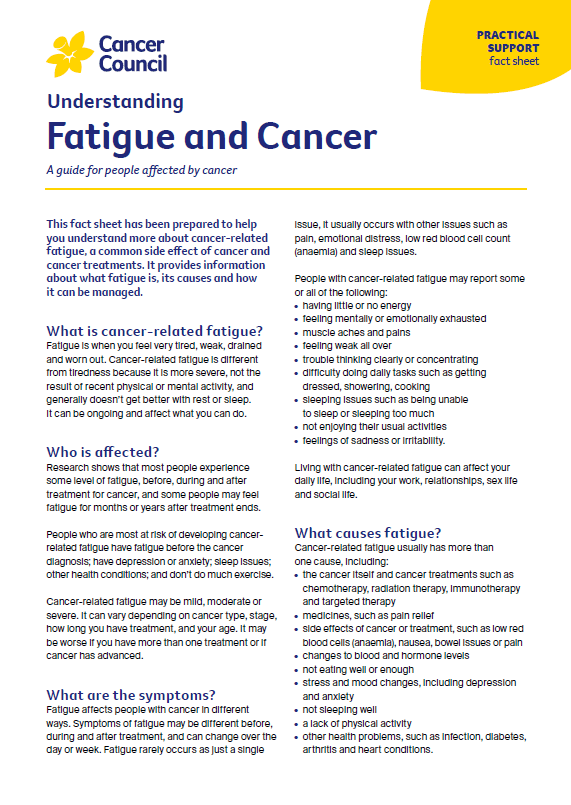Fatigue
Cancer treatments like chemotherapy or radiation therapy, and drugs for pain, antidepressants and sedatives, can cause fatigue (tiredness). The cancer, infections or anaemia (low red blood cells) can also cause fatigue, as may loss of weight and muscle tone, insomnia and anxiety or depression.
Tell your doctor or nurse if you feel weaker or more tired as there may be ways to help. For example, if you have anaemia, it can be managed with medicines. An occupational therapist can give you equipment to make tasks easier and show you how to save your energy.
Learn more about fatigue and cancer.
Tips to help with fatigue
- Plan activities for when you feel less tired, and include rest breaks.
- Do regular gentle activities, like walking to the letterbox, doing stretches or getting out of bed for meals.
- Avoid stress where possible – relaxation techniques or meditation can help. Listen to the relaxation and meditation recordings in our Finding Calm During Cancer podcast series.
- Have short naps rather than one long rest during the day.
- Alcohol can cause tiredness and energy loss, so consider whether you want to drink.
- Use Meals on Wheels or other home delivery meal companies or buy frozen or ready-to-eat meals.
- Delegate some tasks or speak to an occupational therapist about equipment to assist with activities (e.g. a shower chair, a commode).
- Apply for a disability parking sticker to reduce how far you need to walk when going to the hospital or shops.
- Limit visitors if you find they are tiring you.
- Prioritise important activities or those that you feel enrich your wellbeing.
→ READ MORE: Managing pain caused by advanced cancer
I had to accept that I was dealing with fatigue and celebrate small improvements. I had to be careful not to overdo it and whatever help people offered, I took. That was very challenging for me but it helped.
Susan
Podcast: Managing Cancer Fatigue
Listen to more of our podcast for people affected by cancer
Dr Lucy Gately, Medical Oncologist, Alfred Health and Walter and Eliza Institute for Medical Research, VIC; Dr Katherine Allsopp, Supportive and Palliative Care Specialist, Westmead Hospital, NSW; A/Prof Megan Best, The University of Notre Dame Australia and The University of Sydney, NSW; Dr Keiron Bradley, Palliative Care Consultant, Medical Director Palliative Care Program, Bethesda Health Care, WA; Craig Brewer, Consumer; Emeritus Professor Phyllis Butow, Psychologist, The University of Sydney and Chris O’Brien Lifehouse, NSW; Louise Durham, Palliative Care Nurse Practitioner Outpatients, Princess Alexandra Hospital, Metro South Palliative Care, QLD; Dr Roya Merie, Radiation Oncologist, ICON Cancer Centre, Concord, NSW; Penny Neller, Project Coordinator, National Palliative Care Projects, Australian Centre for Health Law Research, Queensland University of Technology, QLD; Caitriona Nienaber, 13 11 20 Consultant, Cancer Council WA; Xanthe Sansome, Program Director, Advance Care Planning Australia, VIC; Sparke Helmore Lawyers; Peter Spolc, Consumer.
View the Cancer Council NSW editorial policy.
View all publications or call 13 11 20 for free printed copies.
